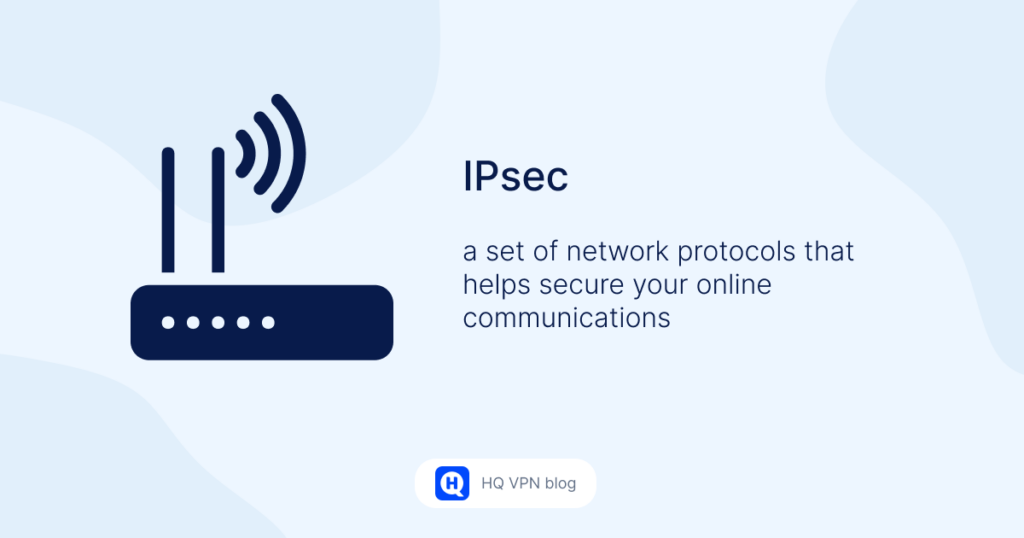

IPsec VPN: Everything You Need to Know

If you’ve ever explored the world of VPNs, chances are you’ve come across the term “IPsec VPN.” This powerful protocol, which stands for Internet Protocol Security, has gained immense popularity in the realm of virtual private networks.
But what exactly is an IPsec VPN and why is it so widely favored? In this blog post, we’ll unravel the inner workings of IPsec VPN and delve into its remarkable capabilities that have solidified its position as one of the most trusted and widely used VPN protocols.
What is IPsec?

IPsec is a widely used technology that adds an extra layer of protection to your internet connection, ensuring that your data stays private and encrypted as it travels over the network.
With IPsec, you can establish a secure and encrypted virtual tunnel between your device and the destination you’re connecting to, whether it’s a website, a server, or another network. This helps prevent unauthorized access, eavesdropping, and tampering with your sensitive information. In simpler terms, IPsec acts like a shield, keeping your online activities safe and your data away from prying eyes.
How does IPsec work?
As we’ve already mentioned IPsec is actually a set of protocols that perform specific tasks.
Basically, IPsec works by using two main protocols: the Security Authentication Header (AH) and the Encapsulating Security Payload (ESP). Let’s break it down in simple terms.
Security Authentication Header (AH)
AH helps ensure the authenticity and integrity of the data being transmitted. It adds a digital signature to each packet, like a virtual seal, which verifies that the packet hasn’t been tampered with or modified during transit. This way, you can trust that the information you receive is genuine and hasn’t been altered by unauthorized parties.
Encapsulating Security Payload (ESP)
ESP takes care of encrypting the actual data within the packets. It puts the data inside a secure “envelope” or “wrapper” that hides its contents from prying eyes. This way, even if someone manages to intercept the packets, they won’t be able to understand the encrypted data without the decryption key.
Together, AH and ESP work hand in hand to ensure the security of your communications. AH verifies the authenticity of the data, while ESP encrypts and protects the actual information within the packets. This combination of authentication and encryption helps create a secure and private channel for your data to travel through, keeping it safe from potential threats and ensuring that your online activities remain confidential.
How IPsec transmits information: tunneling vs transport mode
Once IPsec is set up to use either AH or ESP and the desired transmission mode (transport or tunnel), it affects how information is transmitted. Let’s try and understand the process a bit better.
Transport mode
In transport mode, IPsec only encrypts the actual data payload of each packet while leaving the original IP headers intact. It’s like putting the important contents of a letter into a locked envelope but keeping the address and return address visible. This mode is typically used for securing communication between two specific devices or hosts.
Tunnel mode
In tunnel mode, IPsec creates a new IP packet, called an encapsulating packet, which contains the entire original packet. This new packet is then encrypted and sent through the network. It’s similar to putting the entire letter, including the original envelope, into a new envelope and sealing it securely. This mode is commonly used when establishing a secure connection between networks or when accessing a private network from a remote location.
Regardless of the chosen mode, both AH and ESP provide authentication and encryption to protect the information being transmitted. AH verifies the integrity and authenticity of the packets, while ESP encrypts the data payload to prevent unauthorized access.
IPsec VPN: how it works and what is special about it?
An IPsec VPN is a special type of VPN that ensures secure and private communication over public networks like the Internet. What makes IPsec VPN special is its use of the IPsec protocol suite, which provides a robust set of rules for encryption, data integrity, and authentication.
To understand how IPsec VPN works, let’s take a closer look at the process. When you establish an IPsec VPN connection, the data that needs to be transmitted is encapsulated within an IPsec packet. This encapsulation acts like a protective shield around your data. Next, the packet is encrypted using a cipher, which scrambles the information, making it unreadable to anyone who may intercept it.
Once encrypted, the IPsec packet travels over the internet to the VPN server. At the server, the encrypted packet is decrypted, restoring the original data. This process ensures that even if someone manages to intercept the packet during transmission, they won’t be able to decipher its contents.
The key advantage of IPsec VPN is its ability to establish a secure “tunnel” for data to travel through. This tunneling technique ensures that your information remains confidential and protected from unauthorized access while in transit. Whether you’re accessing resources on a local network from a remote location or connecting from an unprotected public network like a café or airport, IPsec VPN safeguards your communication and keeps your data secure.
Long story short, the key advantages if IPsec VPN are:
- High connection speed
- Very strong ciphers
- High speed of establishing the connection
- Great compatibility with operating systems, routers, and other network devices
IPsec VPN vs SSL VPN
When comparing IPsec VPN and SSL VPN, it’s important to note that their suitability depends on specific use cases and requirements. Let’s explore the differences and benefits of each technology:
IPsec VPN
IPsec (Internet Protocol Security) VPN operates at the network layer of the OSI model, providing security for IP-based communication. Here are its key characteristics and benefits:
- Network-level security. IPsec VPN secures the entire network connection, including all applications and protocols used within the network. It encrypts and authenticates all traffic flowing through the VPN tunnel, ensuring a high level of data protection.
- Wide compatibility. IPsec VPN is supported by a broad range of devices, operating systems, and network equipment. This makes it a suitable choice for organizations with diverse network infrastructure.
- Performance. IPsec VPN is known for its efficient performance, especially in situations where a large volume of traffic needs to be encrypted and transmitted securely.
SSL VPN
SSL (Secure Sockets Layer) VPN operates at the application layer, using the SSL/TLS protocol to create a secure connection. Here are its key characteristics and benefits:
- Application-level access. SSL VPN provides remote access to specific applications or services, rather than granting access to the entire network. It allows users to securely access web applications, email, file sharing, and other specific resources without requiring full network connectivity.
- Ease of use. SSL VPN often leverages web browsers as the client interface, making it easy for users to establish secure connections without the need for additional software installations. It is particularly convenient for remote or mobile users who may access the VPN from various devices.
- Portability. Since SSL VPN relies on web browsers, it is highly portable and can be accessed from any device with an internet connection and a compatible browser.
In summary, the choice between IPsec VPN and SSL VPN depends on factors such as the desired level of network access, compatibility requirements, and performance considerations.
IPsec VPN provides network-level security and is suitable for organizations with diverse infrastructure. On the other hand, SSL VPN offers application-level access, ease of use, and portability, making it convenient for remote and mobile users. Both technologies have their strengths and benefits, and the selection should be based on the specific needs and use cases of the organization or individual.
Does HQ VPN use IPsec?
Yes. At HQ VPN, we understand that security and speed are both crucial for a smooth and enjoyable online experience. That’s why we’ve paired IPSec with OpenVPN.
The combination of OpenVPN and IPsec protocols in HQ VPN brings several potential benefits to users.
Versatility
By supporting both OpenVPN and IPsec protocols, HQ VPN offers users the flexibility to choose the protocol that best suits their needs. OpenVPN is known for its robust security, cross-platform compatibility, and ease of use. On the other hand, IPsec is a widely adopted protocol known for its strong encryption and network-level security. Having both options allows users to select the protocol that aligns with their specific requirements or network setups.
Enhanced security
OpenVPN and IPsec are both renowned for their strong security features. OpenVPN utilizes SSL/TLS encryption, which ensures the confidentiality and integrity of data transmitted between devices. IPsec, on the other hand, offers network-level security through encryption and authentication. The combination of these protocols provides an additional layer of protection, enhancing the overall security of the VPN service and keeping users’ data safe from potential threats.
Compatibility
The inclusion of both OpenVPN and IPsec protocols in HQ VPN increases compatibility with various devices and operating systems. OpenVPN has extensive cross-platform support, allowing users to connect from different devices, including Windows, macOS, Linux, iOS, and Android. IPsec is also widely supported across different platforms and network devices. This compatibility ensures that users can connect to HQ VPN using their preferred devices, regardless of the operating system or device type.
Stability and reliability
OpenVPN and IPsec have a long history and are well-established protocols in the VPN industry. They have been extensively tested and refined over time, resulting in stable and reliable performance. By combining these protocols, HQ VPN aims to provide a reliable and consistent connection experience for users, minimizing disruptions and ensuring a smooth VPN usage.
Broad network accessibility
The combination of OpenVPN and IPsec protocols allows HQ VPN to provide a broader range of network accessibility. OpenVPN is known for its ability to bypass network restrictions and firewalls, making it an ideal choice for accessing content and services that may be blocked or restricted in certain regions. IPsec, with its network-level security, ensures secure communication even in challenging network environments. Together, these protocols enable users to access a wider range of online resources and maintain secure connections, regardless of their location.
By using both OpenVPN and IPSec, HQ VPN is able to provide a balance of security and speed that’s unmatched by other VPNs. With HQ VPN, you can enjoy the peace of mind that comes with knowing your online activity is always protected, while still being able to stream and game at lightning-fast speeds.
Try HQ VPN now and experience the best of both worlds!



